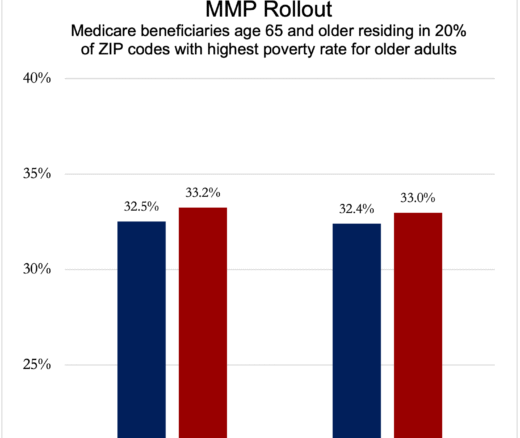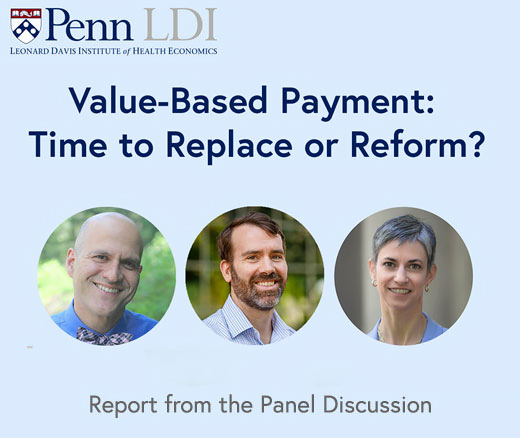
Black Older Adults With Cancer Are Far Less Likely to Get Any Care
New Study From LDI and MD Anderson Finds That Black and Low-Income, Dually Eligible Medicare Patients Are Among the Most Neglected in Cancer Care
News

As he opened the April 10 panel titled Breaking Barriers, Advancing LGBTQ+ Health Equity Through Policy, LDI Senior Fellow and Director of the University of Pennsylvania Eidos LGBTQ+ Health Initiative José Bauermeister, PhD, MPH, focused on how funding for grants and programs canceled by the White House might be restored from other sources.
He pointed out that less than 1% of the total NIH budget previously focused on LGBTQ+ health, even though that community represents between 7% to 10% of the U.S. population. Responding to suggestions that philanthropy or private-sector contributions might be increased, Bauermeister said that for every $100 U.S. philanthropic interests invest, only 23 cents are dedicated to LGBTQ+ health projects. In addition, he said that of the $3 trillion spent on entrepreneurship, less than 0.5% goes to LGBTQ+ entrepreneurs.

“I know this can be a very scary time for many of us, and we must try our best to think about opportunities to inspire and find ways to organize and advocate through policy channels,” Bauermeister told the gathering at a panel discussion held in a Penn Nursing School auditorium as part of the 10th Annual Penn Medicine Health Equity Week. For a decade, Health Equity Week has served to facilitate expert-driven conversations on health and health care disparities with the goal of supporting the development of innovative solutions.
The “Breaking Barriers” panel was co-hosted by Penn’s Leonard Davis Institute of Health Economics and the Eidos LGBTQ+ Health Initiative. Eidos was launched in 2022 as a connector and think tank focused on the well-being of the LGBTQ+ community.
Moderated by Bauermeister, the panel also included Brittany Charlton, MSc, ScD, Associate Professor of Epidemiology at the Harvard T.H. Chan School of Public Health and Director of the Harvard LGBTQ Health Center for Excellence; Jerrica Kirkley, MD, Co-Founder and Chief Medical Officer of Plume Health, a virtual health care provider specializing in gender-affirming care for transgender and gender-nonconforming individuals; and Therese Rodriguez, CEO of Apicha Community Health Center in New York, a federally qualified health center providing health care to LGBTQ+ individuals, Asian and Pacific Islanders, and people living with HIV/AIDS.

The event occurred against a background of sweeping White House moves to dismantle policies and practices protecting LGBTQ+ individuals from discrimination in health care settings. It ended federal Medicare and Medicaid funding for gender-affirming care for minors, with potential implications for adult coverage as well; expanded “conscience rights” allowing health care providers to refuse service to LGBTQ+ patients on religious or moral grounds; mandated the removal of sexual orientation and gender identity (SOGI) medical data from public datasets and surveys; laid off the entire staff and dismantled the Department of Health and Human Services (HHS) Office of Infectious Disease and HIV/AIDS Policy (OIDP); drastically reduced the staff at the Centers for Disease Control and Prevention’s (CDC) Division of HIV; and suspended funding for the HIV Prevention Trials Network and the HIV Vaccine Trials Network.
These actions align with the broader plan laid out in Project 2025, a conservative policy agenda spearheaded by the Heritage Foundation that has become the roadmap for the administration’s new health care policies.

One of the most dramatic changes has occurred at the National Institutes of Health (NIH), which has abruptly terminated hundreds of academic research grants related to transgender and LGBTQ+ health issues, including those studying mental health, cancer, HIV prevention, youth suicide, and aging in LGBTQ+ populations.
However, panelist Charlton noted that the NIH is not just ending research grants in this category; rather, it is likely pivoting its funding to a very different focus. She pointed to an April 3 Nature article detailing NIH plans to prioritize grants for the study of negative consequences of gender-affirming care, such as such as regret and detransition.
As founding director of the newly launched Harvard LGBTQ Health Center for Excellence, Charlton was one of the earliest public critics of the NIH terminations when they first became known in February. Shortly after that, she denounced them in interviews with the Boston Globe, The Atlantic and Science. She said, “One of my concerns is about early-career scientists. We, as taxpayers, have heavily invested in training these scientists through federal training grants, and we’re counting on them to make the discoveries and develop the solutions that will improve health for all. Given the climate, some of the brightest minds may abandon the work.”
And then, the NIH came for her.
“As soon as I heard of the grant terminations, I started pulling together tons of source materials and reaching out to hundreds of journalists, elected officials, and civil rights organizations,” said Charlton. “At the point when I first spoke out, none of my grants were terminated. But just days after, my first termination came. Then, whoever was identifying these grants for termination became much more efficient, wiping out my entire research portfolio. So, I suddenly had no salary. I had to terminate the executive director we had recently hired and find new homes for roughly 18 members of my research team.”
Since then, Charlton has been organizing a lawsuit against the HHS and NIH, in which she is represented by the ACLU, Project Democracy, and other civil rights organizations.

Although it has so far been one of the least mentioned points in general news stories about the White House-dictated changes, panelists found the ban on the collection and collation of sexual orientation and gender identity (SOGI) medical data to be one of the most disturbing.
Since 2016, the Health Resources and Services Administration, which plays a central role in funding federally qualified health centers, has required the centers to collect SOGI data from LGBTQ+ patients as part of efforts to document and address health care inequities.
Hospitals, however, were not required to collect the data. Electronic health record systems certified under the federal Meaningful Use Stage 3 Incentive Program were required to have the capacity to record SOGI data starting in 2018, but that did not translate into a universal mandate for hospitals to actually collect or report the data. However, many of them did so voluntarily.

“In February 2025, HRSA instructed health centers to remove SOGI data from their 2024 annual data report,” said Rodriguez. “Without this data, we erase the existence of LGBTQ+ people from the data. However, their health needs are not eliminated. SOGI data is such an important part of care. For instance, the reality often is that a clinician is facing a trans man and may not know what needs to be provided to a trans man, like screening for cervical or breast cancer.”
Kirkley emphasized the research aspects of SOGI data. “If it goes away in medical records and research studies, we won’t be able to track the health outcomes of people that fall into these marginalized communities,” she said. “If we can’t track it, we don’t know how they are doing, and we can’t know how to intervene to provide adequate and effective care to improve their health.”
Bauermeister read from the boilerplate in the NIH termination letters that have come with many of the terminations that say, “This award no longer effectuates agency priorities. Research programs based primarily on artificial and non-scientific categories, including amorphous equity objectives, are antithetical to the scientific inquiry, do nothing to expand our knowledge of living systems, provide low returns on investment, and ultimately do not enhance health, lengthen life, or reduce illness. Worse, socalled diversity, equity, and inclusion (“DEI”) studies are often used to support unlawful discrimination on the basis of race and other protected characteristics, which harms the health of Americans. Therefore, it is the policy of NIH not to prioritize such research programs.”
“If you do any kind of disparities research, if you focus on a key population because it’s important to understand the mechanisms within that population, you are ‘DEI,’” said Bauermeister. “This is important to understand because it’s not just an LGBTQ+ health issue. This is a broader health equity issue, and it’s still very difficult for many of us to wrap our heads around that.”


New Study From LDI and MD Anderson Finds That Black and Low-Income, Dually Eligible Medicare Patients Are Among the Most Neglected in Cancer Care

Her Transitional Care Model Shows How Nurse-Led Care Can Keep Older Adults Out of the Hospital and Change Care Worldwide

Chart of the Day: Medicare-Medicaid Plans—Created to Streamline Care for Dually Eligible Individuals—Failed to Increase Medicaid Participation in High-Poverty Communities

Penn LDI Debates the Pros and Cons of Payment Reform

Direct-to-Consumer Alzheimer’s Tests Risk False Positives, Privacy Breaches, and Discrimination, LDI Fellow Warns, While Lacking Strong Accuracy and Much More

One of the Authors, Penn’s Kevin B. Johnson, Explains the Principles It Sets Out